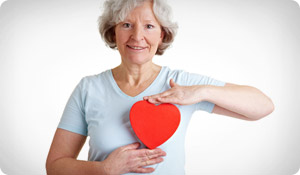
At one point in the melodramatic (but undeniably enchanting) movie Titanic the heroine, Rose, remarks, "A woman's heart is a deep ocean of secrets." That's the truth! Beyond harboring long-lost loves and tales of tragic shipwrecks, your heart holds health secrets. But, unlike in the movies, you want these truths out in the open. Knowing essential facts about how to protect your heart can empower you to enjoy a longer, healthier life (barring icebergs and jealous fiancés, of course.)
Secret #1: Heart disease happens slowly.
Life-threatening conditions are usually the result of things that build up over time. That's why older women are more likely to get heart disease. But that doesn't mean you can't slow the effects of years of indulging in rich foods, cigarettes, or a less-than-healthy lifestyle. It's never too late to start eating well, exercising regularly, or quitting smoking. These changes may be able to help you cut your risk of heart disease by more than 80 percent. In some cases, medication may also help you to avoid severe complications related to heart disease.
Secret #2: A heart attack may not feel the way you expect it to.
Unlike men, who usually have crushing chest pain when they are suffering from a myocardial infarction (AKA heart attack), women are more likely to feel discomfort in the neck, shoulder, abdomen, or upper back during an attack. Other classic symptoms of a female heart attack include nausea, lightheadedness, fatigue, or shortness of breath. These differences may be due to the fact that women often have blockages in small arteries that supply blood to the heart as well as in main arteries. If you experience these symptoms, it's important to go to the emergency room right away and insist on being checked for signs of a heart attack. This early treatment can help you avoid learning firsthand about secret number 3...
Secret #3: It is especially important for women to take action after a heart attack.
The statistics speak volumes: not only is heart disease the number one killer of women in America, it is also the leading cause of disability. In fact, about 66 percent of women who suffer a myocardial infarction continue to suffer some sort of physical impairment. Women are also more likely than men to die within two weeks of having a heart attack. Thirty nine percent will die within the first year vs. 31 percent of men. One of the main reasons is that women either miss the signs themselves or are misdiagnosed when they show up at the hospital. Being aware of the classic "female symptoms" of heart disease can help you get the right treatment sooner so you can improve the likelihood you will make a good recovery.
Secret #4: Women are also more likely than men to suffer from broken heart syndrome.
While it might sound like another Hollywood plot twist, broken heart syndrome is a real condition that is increasingly recognized as a risk to heart health. The causes of broken heart syndrome, how to diagnose it, and treatments are still all being researched, but it seems that extreme emotional stress can cause a previously healthy person to suffer from heart muscle failure. Recovery is usually quick and there shouldn't be any long-term effects, but the incident itself can cause you additional stress and affect your quality of life in subtle ways.
Sources:
"Heart Disease Fact Sheet."Women's Health.gov. Web. 20 February 2012
http://womenshealth.gov/publications/our-publications/fact-sheet/heart-disease.cfm
"Heart Disease in Women." MedlinePlus: National Heart Blood Lung Institute. Web. 20 February 2012
http://www.nlm.nih.gov/medlineplus/heartdiseaseinwomen.html
Mayo Clinic "Heart disease in women: Understand symptoms and risk factors." Web. 20 February 2012
http://www.mayoclinic.com/health/heart-disease/HB00040
Rosenfeld, Lynda E., M.D. "Women and Heart Disease." Yale University School of Medicine Heart Book. Eds. Barry L. Zaret, M.D., et. al. New York: Hearst Books, 1992. Web. 20 February 2012
http://www.med.yale.edu/library/heartbk/19.pdf





